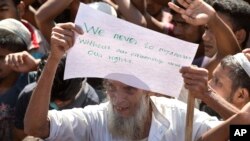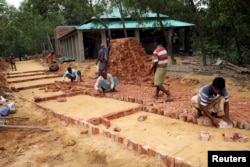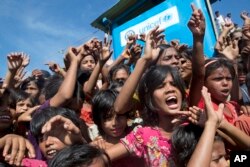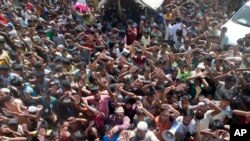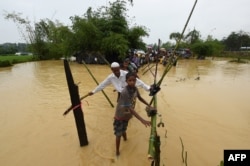Bangladesh’s plans to begin repatriating Rohingya Muslims to Myanmar Thursday were scrapped because officials were unable to find anyone who wanted to return to the country that has been accused of driving out hundreds of thousands in a campaign of ethnic cleansing.
The refugees “are not willing to go back now,” Refugee Commissioner Abul Kalam told The Associated Press. He said officials “can’t force them to go” but will continue to try to “motivate them so it happens.”
Some people on the government’s repatriation list disappeared into the sprawling refugee camps to avoid being sent home, while others joined a large demonstration against the plan.
UN urged a halt to repatriation
More than 700,000 Rohingya Muslims fled to Bangladesh from western Myanmar’s Rakhine state since August 2017 to escape killings and destruction of their villages by the military and Buddhist vigilantes that have drawn widespread condemnation of Myanmar.
The United Nations, whose human rights officials had urged Bangladesh to halt the repatriation process even as its refugee agency workers helped to facilitate it, welcomed Thursday’s development.
Firas Al-Khateeb, a spokesman for the U.N. High Commissioner for Refugees in Cox’s Bazar, said it was unclear when the process might begin again.
“We want their repatriation, but it has to be voluntary, safe and smooth,” he said.
Bangladesh officials declined to say whether another attempt at repatriation would be made Friday.
Bangladesh Foreign Minister A.H. Mahmood Ali told reporters in Dhaka late Thursday that “there is no question of forcible repatriation. We gave them shelter, so why should we send them back forcibly?”
Pleading with Rohingya
At the Unchiprang refugee camp, a Bangladeshi refugee official implored the Rohingya on Thursday to return to their country over a loudspeaker.
“We have arranged everything for you, we have six buses here, we have trucks, we have food. We want to offer everything to you. If you agree to go, we’ll take you to the border, to the transit camp,” he said.
“We won’t go!” hundreds of voices, including children’s, chanted in reply.
Some refugees on the repatriation lists, which authorities say were drawn up with assistance from the UNHCR, said they don’t want to go back.
‘I don’t want to go back’
At the Jamtoli refugee camp, one of the sprawling refugee settlements near the city of Cox’s Bazar, 25-year-old Setara said she and her two children, age 4 and 7, were on a repatriation list, but her parents were not. She said she had never asked to return to Myanmar, and that she had sent her children to a school run by aid workers Thursday morning as usual.
“They killed my husband; now I live here with my parents,” said Setara, who only gave one name. “I don’t want to go back.”
She said that other refugees on the repatriation list had fled to other camps, hoping to disappear amid the crowded lanes of refugees, aid workers and Bangladeshi soldiers, which on Thursday were bustling with commerce and other activity.
Plan to return 150 a day
Bangladesh had planned to send an initial group of 2,251 back from mid-November at a rate of 150 per day.
Myanmar officials, speaking late Thursday in the capital, Naypyitaw, said they were ready to receive the refugees. Despite those assurances, human rights activists said conditions were not yet safe for the Rohingya to go back.
The exodus began after Myanmar security forces launched a brutal crackdown following attacks by an insurgent group on guard posts. The scale, organization and ferocity of the crackdown led the U.N. and several governments to accuse Myanmar of ethnic cleansing and genocide.
Most people in Buddhist-majority Myanmar do not accept that the Rohingya Muslims are a native ethnic group, viewing them as “Bengalis” who entered illegally from Bangladesh, even though generations of Rohingya have lived in Myanmar. Nearly all have been denied citizenship since 1982, as well as access to education and hospitals.
Refugee camps bleak
The refugees survived the ransacking of villages, rapes and killings in Myanmar, but for many, life in Bangladesh’s squalid refugee camps has been bleak.
The refugees who’ve arrived in the last year joined a wave of 250,000 Rohingya Muslims who escaped forced labor, religious persecution and violent attacks from Buddhist mobs in Myanmar during the early 1990s.
Access to education and employment has been far from assured.
Bangladesh Prime Minister Sheikh Hasina, who hopes to retain power in December elections, has repeatedly complained that hosting more than a million Rohingya is taxing local resources.
Negotiations for repatriation have been in the works for months, but plans last January to begin sending refugees back were called off amid concerns among aid workers and Rohingya that their return would be met with violence.
Foreign leaders, including U.S. Vice President Mike Pence, criticized Myanmar’s leader Aung San Suu Kyi this week on the sidelines of a summit of the Association of Southeast Asian Nations in Singapore for her handling of the Rohingya crisis.
But on Thursday, Pence said that U.S. officials were “encouraged to hear that” the repatriation process would begin.
Canadian Prime Minister Justin Trudeau said his country would continue working with international partners including the U.N. “to ensure that the Rohingya themselves are part of any decisions on their future.”




